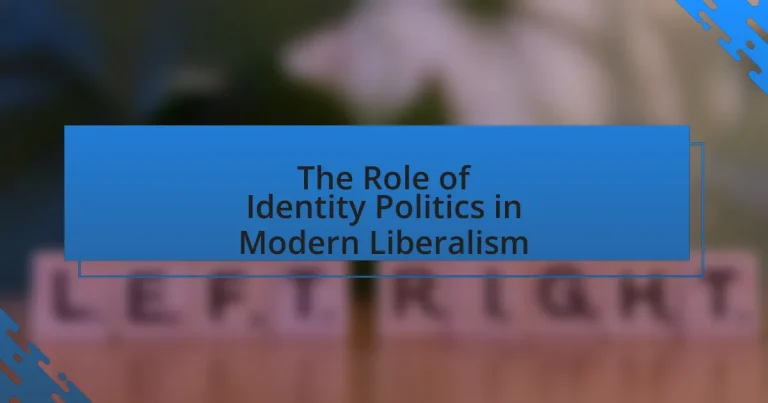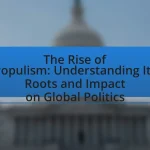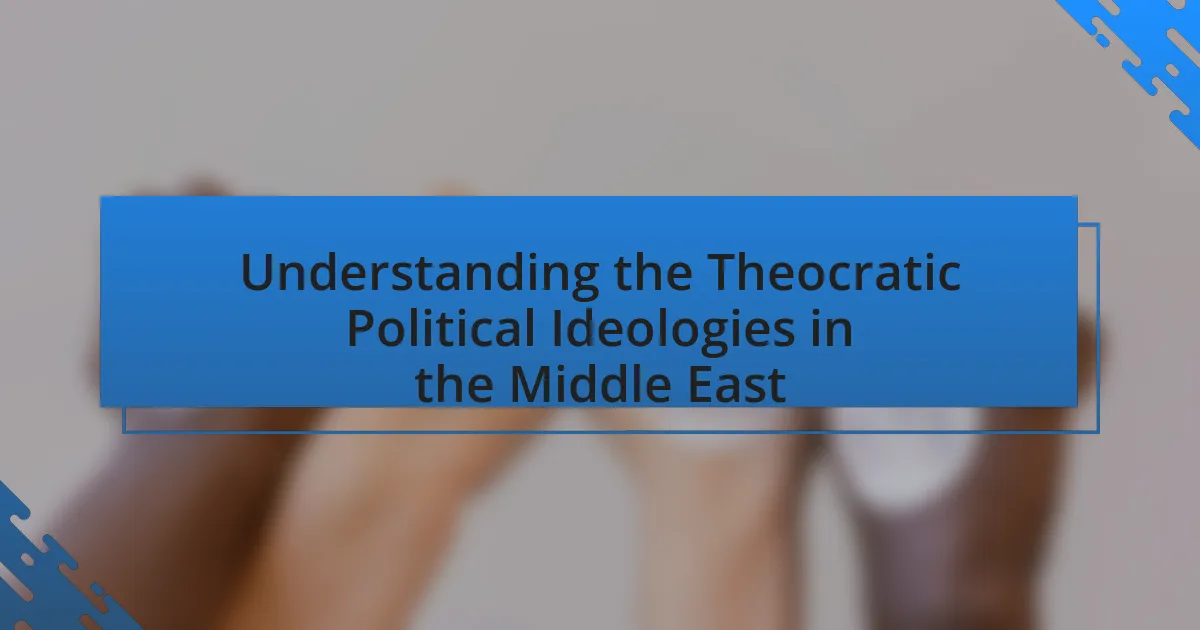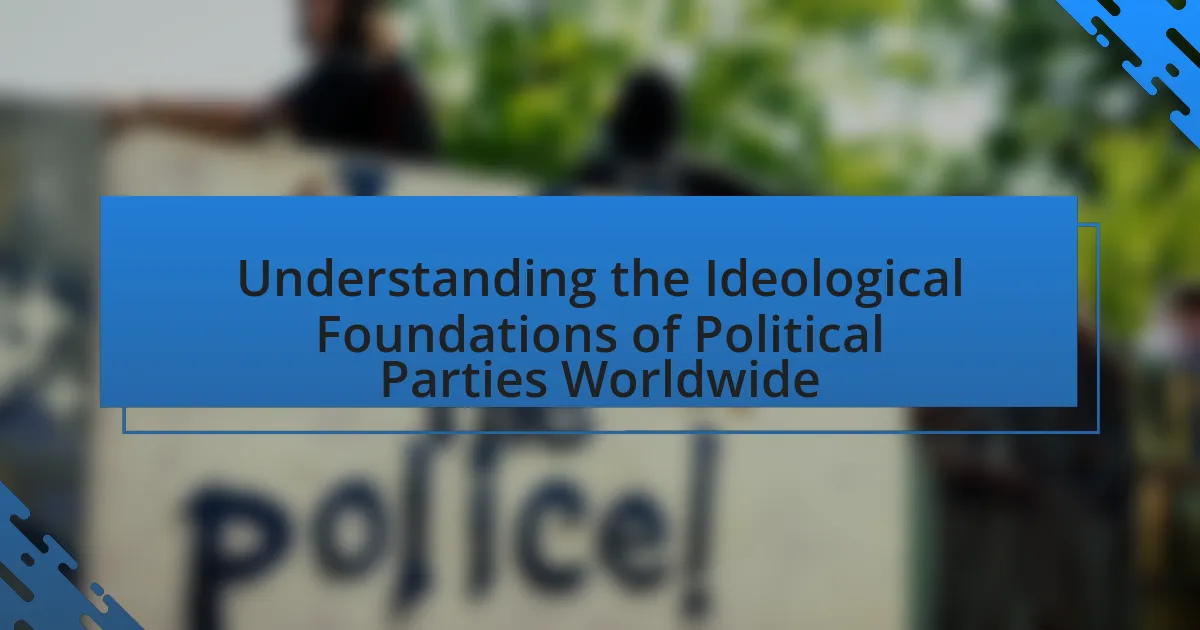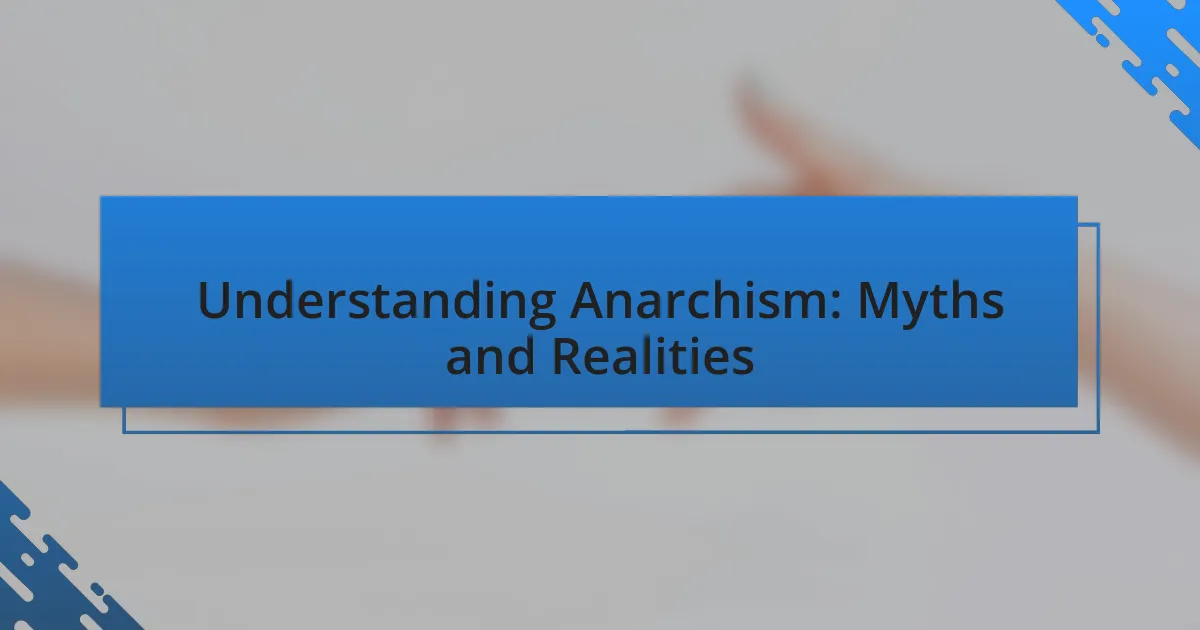The article examines the role of identity politics within modern liberalism, highlighting its significance in addressing historical injustices and systemic inequalities faced by marginalized groups, including racial minorities, women, and individuals. It discusses the evolution of identity politics from class-based struggles to a focus on diverse social identities, influenced by key historical movements such as the Civil Rights Movement and the feminist movement. The article also explores the implications of identity politics for policy-making in liberal democracies, the challenges it poses to social cohesion, and the potential for fragmentation within liberal movements. Additionally, it considers the intersection of identity politics with other political ideologies and offers strategies for reconciling identity politics with universal liberal values.
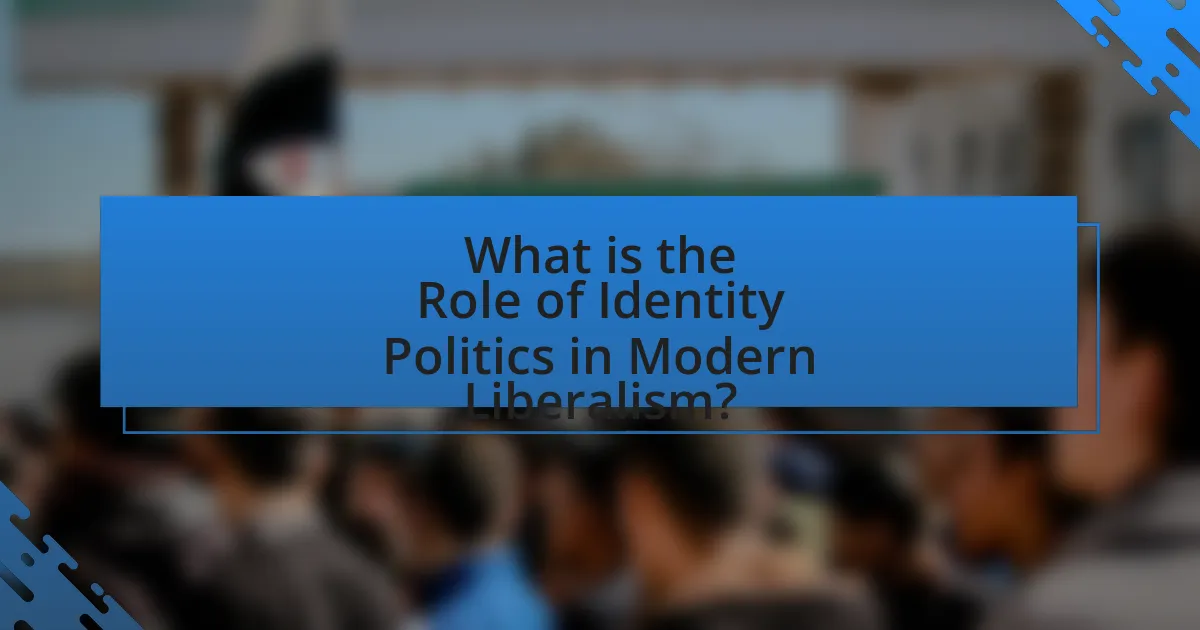
What is the Role of Identity Politics in Modern Liberalism?
Identity politics plays a significant role in modern liberalism by emphasizing the importance of individual and group identities in political discourse and policy-making. This approach seeks to address historical injustices and systemic inequalities faced by marginalized groups, such as racial minorities, women, and individuals. By advocating for representation and inclusion, identity politics aims to create a more equitable society, as evidenced by movements like Black Lives Matter and the push for marriage equality, which have reshaped liberal agendas and policies. These movements highlight the necessity of recognizing diverse identities to foster social justice and political representation, thereby reinforcing the core tenets of modern liberalism.
How has identity politics evolved within the framework of modern liberalism?
Identity politics has evolved within modern liberalism by shifting from a focus on class-based struggles to emphasizing the rights and recognition of diverse social identities, including race, gender, and sexual orientation. This evolution began in the late 20th century, particularly during the civil rights movements, where marginalized groups sought political representation and social justice. The rise of intersectionality, a concept introduced by Kimberlé Crenshaw in 1989, further highlighted how various identities intersect and affect individuals’ experiences of oppression, leading to a more nuanced understanding within liberal frameworks. As a result, modern liberalism increasingly incorporates identity politics into its policies and discourse, advocating for inclusivity and equity, as seen in legislative measures like the Equality Act in the United States, which aims to protect individuals from discrimination based on sexual orientation and gender identity.
What historical events have shaped the relationship between identity politics and liberalism?
The relationship between identity politics and liberalism has been shaped by several key historical events, including the Civil Rights Movement, the feminist movement, and the rights movement. The Civil Rights Movement in the 1960s, exemplified by the passage of the Civil Rights Act of 1964, highlighted the need for legal recognition of racial equality, influencing liberalism to incorporate issues of race and identity into its framework. The feminist movement, particularly the second wave in the 1970s, further expanded liberalism’s focus to include gender equality, leading to significant legislative changes such as Title IX in 1972, which prohibited gender discrimination in education. Additionally, the rights movement gained momentum in the late 20th century, culminating in landmark events like the legalization of same-sex marriage in the United States in 2015, which reinforced the liberal commitment to individual rights and personal identity. These events collectively illustrate how identity politics have influenced liberalism to adapt and respond to the diverse needs of various marginalized groups.
How do different social movements influence identity politics in liberal thought?
Different social movements significantly shape identity politics within liberal thought by advocating for the recognition and rights of marginalized groups. For instance, the civil rights movement in the United States during the 1960s highlighted racial injustices and led to the establishment of policies aimed at promoting equality, which became integral to liberal ideology. Similarly, the feminist movement has influenced liberal thought by emphasizing gender equality and women’s rights, resulting in legislative changes such as the Equal Pay Act of 1963. These movements have prompted liberal theorists to incorporate diverse identities into their frameworks, thereby expanding the understanding of justice and equality to include various social identities, such as race, gender, and sexual orientation. This evolution reflects a broader commitment within liberalism to address systemic inequalities and promote inclusivity, demonstrating how social movements actively reshape the discourse around identity politics.
Why is identity politics significant in contemporary liberal discourse?
Identity politics is significant in contemporary liberal discourse because it addresses the diverse experiences and needs of marginalized groups, fostering inclusivity and representation. This approach allows for a more nuanced understanding of social justice, as it emphasizes the importance of identity in shaping individuals’ experiences and perspectives. Research indicates that movements centered on identity, such as those advocating for racial, gender, and rights, have led to substantial policy changes and increased awareness of systemic inequalities. For instance, the rise of intersectionality as a framework has highlighted how overlapping identities can compound discrimination, thereby influencing liberal policies aimed at equity and justice.
What are the key arguments for and against identity politics in liberalism?
The key arguments for identity politics in liberalism include the promotion of social justice and the recognition of marginalized groups, which aims to address systemic inequalities. Proponents argue that identity politics empowers individuals by validating their experiences and fostering solidarity among those with shared identities, thus enhancing political representation and participation. For instance, the civil rights movement in the United States exemplifies how identity politics can lead to significant legislative changes, such as the Civil Rights Act of 1964, which aimed to eliminate discrimination based on race.
Conversely, the key arguments against identity politics in liberalism focus on the potential for division and the undermining of universal liberal principles. Critics contend that emphasizing group identities can lead to fragmentation within society, fostering an “us versus them” mentality that detracts from collective goals. Additionally, some argue that identity politics can overshadow individual merit and create a hierarchy of victimhood, which may hinder social cohesion. The backlash against identity politics is evident in political discourse, where figures like Barack Obama have cautioned against excessive focus on identity, advocating instead for a more inclusive approach that emphasizes common humanity.
How does identity politics affect the inclusivity of liberal policies?
Identity politics can limit the inclusivity of liberal policies by prioritizing specific group identities over universal principles. This focus on particular identities may lead to fragmentation within the broader liberal agenda, as policies become tailored to the needs of distinct groups rather than addressing common societal issues. For instance, research by the Pew Research Center indicates that individuals who strongly identify with a specific group may advocate for policies that benefit their group at the expense of broader coalitions, potentially alienating other groups and undermining collective action. Consequently, while identity politics aims to elevate marginalized voices, it can inadvertently create divisions that challenge the foundational inclusivity of liberalism.
What challenges does identity politics pose to modern liberalism?
Identity politics poses significant challenges to modern liberalism by emphasizing group identity over individual rights, which can lead to fragmentation within society. This focus on collective identities often results in a prioritization of group grievances, potentially undermining the universal principles of equality and individual liberty that are foundational to liberalism. For instance, the rise of identity-based movements can create divisions that complicate consensus-building and policy-making, as seen in debates surrounding affirmative action and representation. Additionally, identity politics can foster an environment where dissenting views are marginalized, contradicting the liberal commitment to free speech and open discourse.
How can identity politics lead to fragmentation within liberal movements?
Identity politics can lead to fragmentation within liberal movements by prioritizing specific group identities over a unified political agenda. This focus on individual identities, such as race, gender, or sexual orientation, can create divisions among members who may feel that their particular issues are not adequately represented or prioritized. For instance, the rise of various identity-based groups can result in competing interests, making it challenging to form a cohesive strategy that addresses broader liberal goals. Research indicates that when movements become too centered on identity, they risk alienating potential allies who may not share the same specific identity concerns, ultimately weakening the overall movement. This fragmentation is evident in various liberal contexts, where the emphasis on identity has sometimes led to infighting and a lack of solidarity on shared political objectives.
What are the potential risks of prioritizing identity over common liberal values?
Prioritizing identity over common liberal values can lead to fragmentation within society, undermining social cohesion. When identity becomes the primary focus, it can create divisions among groups, fostering an “us versus them” mentality that erodes the shared principles of equality and individual rights central to liberalism. This fragmentation can result in increased polarization, where individuals prioritize group identity over collective democratic goals, as evidenced by rising tensions in multicultural societies. Furthermore, prioritizing identity may lead to the marginalization of individuals who do not conform to dominant identity narratives, thereby contradicting the liberal commitment to inclusivity and universal rights.
How does identity politics intersect with other political ideologies?
Identity politics intersects with other political ideologies by emphasizing the significance of social identities, such as race, gender, and sexual orientation, in shaping political beliefs and actions. This intersection often manifests in how various ideologies, including liberalism, conservatism, and socialism, address issues of representation and equality. For instance, modern liberalism incorporates identity politics to advocate for marginalized groups, arguing that systemic inequalities must be acknowledged and addressed to achieve social justice. In contrast, conservatism may critique identity politics as divisive, promoting a more universal approach to governance that prioritizes individual merit over group identity. Additionally, socialism intersects with identity politics by highlighting class struggles while also recognizing the importance of intersecting identities, as seen in the works of theorists like bell hooks and Angela Davis, who argue that race and gender cannot be separated from economic issues. This multifaceted interaction illustrates how identity politics can both enrich and complicate the discourse within various political ideologies.
What role does identity politics play in the context of socialism and conservatism?
Identity politics significantly influences both socialism and conservatism by shaping their respective approaches to social justice and group identity. In socialism, identity politics often emphasizes the importance of marginalized groups, advocating for policies that address systemic inequalities based on race, gender, and class, as seen in movements like Black Lives Matter and feminist activism. This focus aims to create a more equitable society by recognizing and addressing the unique challenges faced by these groups.
Conversely, conservatism typically critiques identity politics, arguing that it can lead to division and undermine a shared national identity. Conservative perspectives often prioritize individualism over group identity, suggesting that an emphasis on identity can detract from universal values and social cohesion. For example, conservative commentators frequently express concerns that identity politics fosters resentment and tribalism, which can destabilize societal unity.
The interplay between identity politics, socialism, and conservatism illustrates a fundamental ideological divide regarding the role of group identity in shaping political discourse and policy.
How do intersectionality and identity politics interact within liberal frameworks?
Intersectionality and identity politics interact within liberal frameworks by emphasizing the complexity of social identities and the need for inclusive policies that address multiple forms of discrimination. Intersectionality, a concept developed by Kimberlé Crenshaw, highlights how various social categories such as race, gender, and class intersect to create unique experiences of oppression. In liberal frameworks, identity politics seeks to empower marginalized groups by advocating for their specific needs and rights, thereby promoting social justice. This interaction is evident in policy-making, where liberal agendas increasingly incorporate intersectional perspectives to ensure that legislation addresses the diverse experiences of individuals. For instance, the implementation of affirmative action policies often considers multiple identities to rectify systemic inequalities, demonstrating how intersectionality informs identity politics within liberalism.
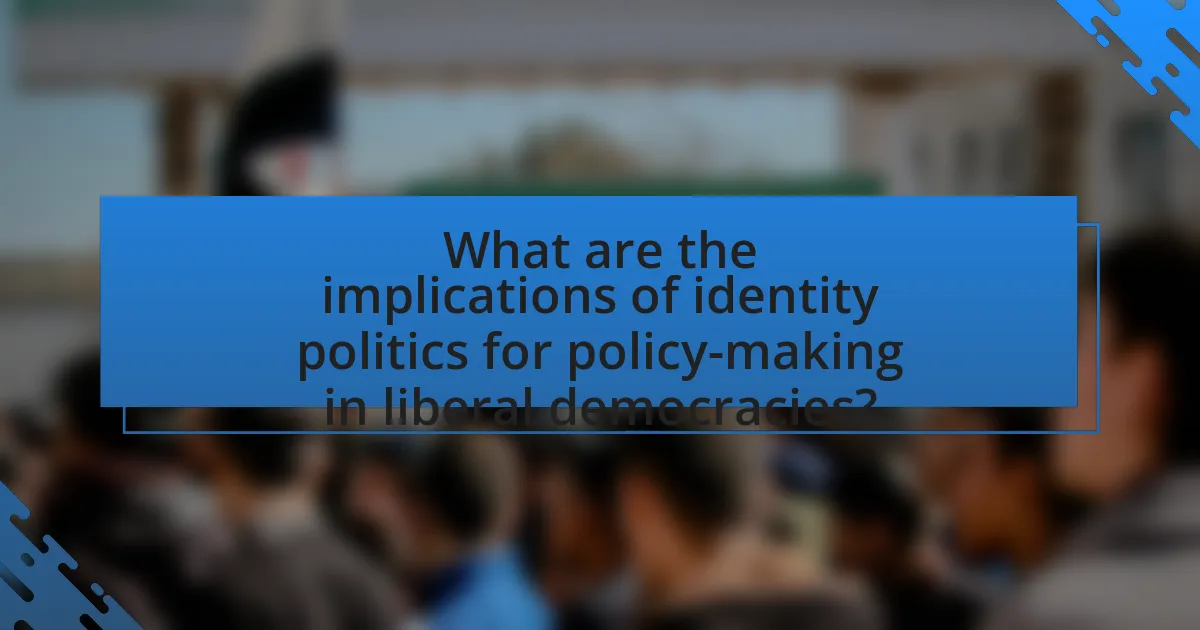
What are the implications of identity politics for policy-making in liberal democracies?
Identity politics significantly influences policy-making in liberal democracies by prioritizing the interests and rights of specific social groups based on shared characteristics such as race, gender, and sexual orientation. This focus can lead to the creation of policies that aim to address historical injustices and promote equity, as seen in affirmative action programs and anti-discrimination laws. For instance, the implementation of the Civil Rights Act of 1964 in the United States was a direct response to identity-based movements advocating for racial equality, demonstrating how identity politics can shape legislative agendas. Additionally, identity politics can polarize public opinion, as different groups may advocate for conflicting interests, complicating consensus-building in policy-making processes. This polarization is evident in debates surrounding immigration and rights, where divergent group interests can lead to legislative gridlock.
How does identity politics influence legislative agendas?
Identity politics significantly influences legislative agendas by prioritizing the interests and rights of specific social groups, such as racial minorities, women, and individuals. This prioritization often leads to the introduction of policies aimed at addressing systemic inequalities and promoting social justice. For instance, the rise of identity politics in the United States has resulted in legislative efforts like the Equality Act, which seeks to expand protections against discrimination based on sexual orientation and gender identity. Additionally, research by the Pew Research Center indicates that voters increasingly support candidates who advocate for policies that reflect their identity-based concerns, thereby shaping the platforms of political parties and influencing electoral outcomes.
What specific policies have emerged as a result of identity politics?
Specific policies that have emerged as a result of identity politics include affirmative action, diversity and inclusion initiatives, and targeted social programs aimed at marginalized groups. Affirmative action policies, implemented in various sectors such as education and employment, aim to increase representation of historically underrepresented communities, particularly racial minorities and women. For instance, the U.S. Supreme Court case Grutter v. Bollinger (2003) upheld the use of affirmative action in university admissions to promote diversity. Diversity and inclusion initiatives in workplaces focus on creating equitable environments by implementing training programs and hiring practices that prioritize diverse candidates. Additionally, targeted social programs, such as the Supplemental Nutrition Assistance Program (SNAP) and housing assistance, often address the specific needs of low-income and minority populations, reflecting the influence of identity politics on social welfare policies.
How do identity-based advocacy groups shape policy outcomes?
Identity-based advocacy groups shape policy outcomes by mobilizing collective action and influencing public discourse to promote specific interests and rights. These groups leverage their unique perspectives and experiences to advocate for legislative changes, often resulting in the adoption of policies that address systemic inequalities. For instance, the American Civil Liberties Union (ACLU) has successfully influenced policy on issues such as rights and immigration reform through strategic litigation and public campaigns, demonstrating the effectiveness of advocacy in shaping legal frameworks. Additionally, research indicates that when marginalized communities organize and advocate for their rights, they can significantly impact policy decisions, as seen in the civil rights movement, which led to landmark legislation like the Civil Rights Act of 1964.
What are the criticisms of identity politics in policy-making?
Critics of identity politics in policy-making argue that it can lead to divisiveness and fragmentation within society. This approach often prioritizes group identity over individual merit, which can undermine social cohesion and promote a sense of competition among different identity groups. For instance, scholars like Francis Fukuyama in “Identity: The Demand for Dignity and the Politics of Resentment” (2018) highlight how identity politics can exacerbate social tensions by fostering an “us versus them” mentality. Additionally, critics contend that identity politics may distract from broader systemic issues, such as economic inequality, by focusing on specific grievances rather than addressing root causes. This perspective is supported by research from the American Political Science Review, which indicates that identity-based policies can sometimes alienate potential allies and hinder collaborative efforts for social change.
How do critics argue that identity politics undermines universal rights?
Critics argue that identity politics undermines universal rights by prioritizing group identity over individual rights, which can lead to the fragmentation of social cohesion. This perspective suggests that when political discourse focuses on specific identities, it risks marginalizing universal principles that apply to all individuals, such as equality and justice. For instance, scholars like Andrew Sullivan have pointed out that identity politics can create divisions that detract from collective action aimed at achieving broader human rights. Furthermore, critics contend that this focus on identity can lead to a hierarchy of victimhood, where certain groups are seen as more deserving of rights than others, ultimately eroding the foundation of universal human rights that should apply equally to everyone.
What alternative approaches do critics propose to identity politics in liberalism?
Critics propose several alternative approaches to identity politics in liberalism, including universalism, class-based politics, and civic nationalism. Universalism advocates for a focus on shared human rights and common values rather than group identities, emphasizing individual rights over collective identities. Class-based politics shifts the focus to economic inequalities and class struggles, arguing that addressing class issues can unite diverse groups under a common cause. Civic nationalism promotes a sense of belonging based on shared citizenship and democratic values, rather than ethnic or cultural identities, fostering inclusivity while minimizing divisive identity politics. These alternatives aim to create a more cohesive society by prioritizing commonalities over differences.
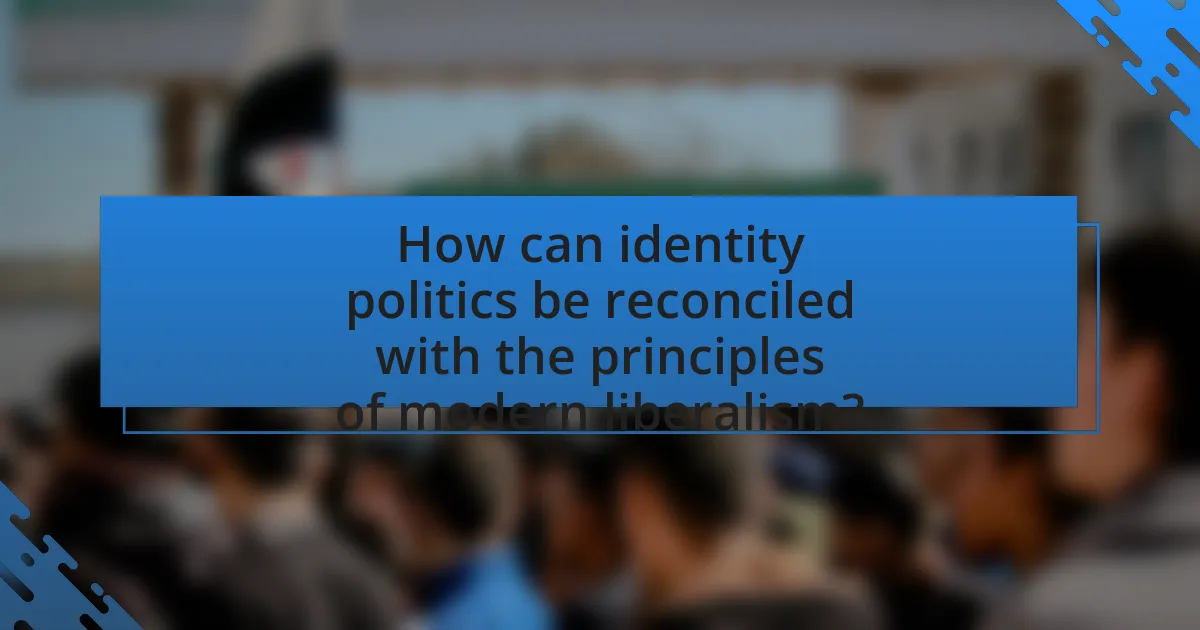
How can identity politics be reconciled with the principles of modern liberalism?
Identity politics can be reconciled with the principles of modern liberalism by emphasizing individual rights while acknowledging the importance of group identities in achieving social justice. Modern liberalism advocates for the protection of individual freedoms and equal rights, which can be enhanced by recognizing the unique challenges faced by marginalized groups. For instance, policies that address systemic inequalities, such as affirmative action or anti-discrimination laws, align with liberal values by promoting equality and protecting individual rights. Historical examples, such as the civil rights movement in the United States, demonstrate how identity politics can lead to significant advancements in liberal democratic principles by advocating for the rights of specific groups, ultimately benefiting society as a whole.
What strategies can be employed to balance identity politics with liberal values?
To balance identity politics with liberal values, strategies such as fostering inclusive dialogue, promoting intersectionality, and emphasizing shared human rights can be employed. Inclusive dialogue encourages open discussions that respect diverse perspectives while aligning with liberal principles of freedom of expression. Promoting intersectionality recognizes that individuals may belong to multiple identity groups, allowing for a more nuanced understanding of social justice that complements liberal values of equality and fairness. Emphasizing shared human rights reinforces the idea that all individuals, regardless of their identity, deserve equal treatment and protection under the law, which is a core tenet of liberalism. These strategies collectively aim to create a cohesive framework that respects individual identities while upholding universal liberal values.
How can liberal movements foster unity while embracing diversity?
Liberal movements can foster unity while embracing diversity by promoting inclusive policies that recognize and celebrate individual identities within a collective framework. This approach encourages collaboration among diverse groups, allowing for shared goals that respect cultural differences. For instance, the implementation of affirmative action policies has historically aimed to level the playing field for marginalized communities, thereby fostering a sense of belonging and unity among various identity groups. Research indicates that inclusive practices not only enhance social cohesion but also lead to better decision-making outcomes, as diverse perspectives contribute to more comprehensive solutions.
What role does dialogue play in reconciling differing identity perspectives?
Dialogue serves as a crucial mechanism for reconciling differing identity perspectives by facilitating understanding and empathy among individuals with diverse backgrounds. Through open communication, dialogue allows participants to share their experiences, beliefs, and values, which can lead to a greater appreciation of each other’s viewpoints. Research indicates that dialogue promotes conflict resolution and social cohesion, as evidenced by studies showing that communities engaged in dialogue initiatives report increased trust and reduced prejudice. For instance, the “Intergroup Dialogue” model, developed by researchers at the University of Michigan, demonstrates that structured conversations can effectively bridge divides between conflicting identity groups, fostering mutual respect and collaboration.
What best practices can be adopted to navigate identity politics in liberal contexts?
To navigate identity politics in liberal contexts effectively, individuals and organizations should prioritize open dialogue and active listening. Engaging in conversations that respect diverse perspectives fosters understanding and reduces polarization. Research indicates that inclusive discussions can lead to more collaborative environments, as seen in studies by the American Psychological Association, which highlight the benefits of dialogue in reducing biases and enhancing group cohesion. Additionally, promoting intersectionality—recognizing how various identities intersect—can help address the complexities of identity politics, ensuring that multiple voices are represented and heard. This approach not only validates individual experiences but also strengthens community ties, as evidenced by initiatives in various liberal democracies that have successfully integrated intersectional frameworks into policy-making.
How can organizations effectively engage with identity politics in their missions?
Organizations can effectively engage with identity politics in their missions by incorporating diverse perspectives and prioritizing inclusivity in their policies and practices. This approach not only aligns with the values of modern liberalism, which emphasizes equality and representation, but also enhances organizational effectiveness by fostering a sense of belonging among various identity groups. Research indicates that organizations that embrace diversity are more innovative and perform better financially; for instance, a McKinsey report found that companies in the top quartile for gender diversity on executive teams were 21% more likely to experience above-average profitability. By actively listening to and addressing the concerns of marginalized communities, organizations can create mission statements that resonate with a broader audience, ultimately leading to greater engagement and support.
What lessons can be learned from successful integration of identity politics in liberalism?
Successful integration of identity politics in liberalism teaches the importance of inclusivity and representation in political discourse. This integration has demonstrated that acknowledging diverse identities can strengthen democratic engagement and foster social cohesion. For instance, the rise of movements advocating for racial, gender, and rights has led to significant policy changes, such as the legalization of same-sex marriage in numerous countries, which reflects a broader acceptance of diverse identities within liberal frameworks. Additionally, research indicates that political parties embracing identity politics often mobilize previously disengaged voter demographics, enhancing electoral participation and representation. This evidence underscores that successful integration of identity politics not only enriches liberalism but also promotes a more equitable society.
